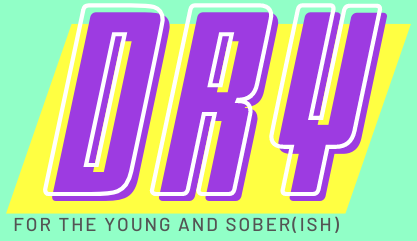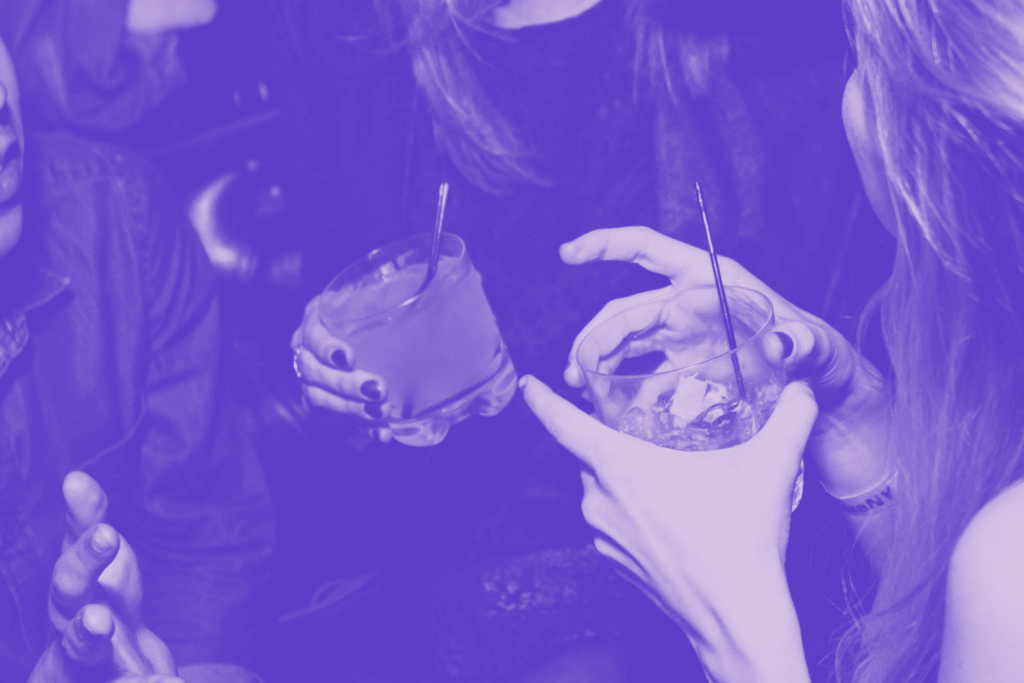Drinking can trigger ‘feel good’ chemicals in the brain, allowing people to forget their nerves and enjoy themselves. Also known as the ‘ buzz’, this feeling can make people more self-confident and talkative. Everything becomes more exciting; conversations flow with ease, dancing is effortless and laughter feels euphoric.
The ‘buzz’ is caused by a rise in Blood Alcohol Concentration (BAC) levels, leading to temporary feelings of excitement. However, when alcohol consumption stops, these positive feelings diminish and are often replaced by negative ones – also known as a hangover. For many, the idea of going sober and not getting that temporary thrill is scary. But we spoke to four sober women who say it is possible to recreate the buzz, without the inevitable hangover at the other end.
Dr. Brooke Scheller, 33, is a Doctor of Clinical Nutrition who specialises in using food and nutrition to change people’s relationship with alcohol. As a sober woman, Scheller says that it can take a while to learn new ways to have fun, de-stress and connect with friends.
“The start of sobriety or a sober-curious lifestyle can initially feel like the end of your fun, but many of us have found that we now experience fun with more clarity and true enjoyment, without the burden of a hangover,” she says.
Scheller believes that drinking regularly will influence your brain in terms of how it associates alcohol with pleasure. “This is especially true if you have used alcohol to have fun for many years, and even more so if you started drinking as a teenager,” she says. “But research shows you can rewire the brain to seek pleasure in new ways, which starts by eliminating alcohol from the mix.”
When attending social events where alcohol will be present, Scheller suggests bringing your own seltzers, mocktails or other drinks, to have for yourself or share with others. “This is so that I still have something to hold in my hand. It seems simple, but it takes the edge off drinking,” Scheller explains. “Remember that you can always suggest non-alcohol related activities with friends, too. Try visiting a museum, taking a walk, or crafts like ceramics or painting.”
Yaz Spark, 34, is the founder of Align events, which aims to “bring the party back into sobriety”. Spark has been sober since 2016, after realising that she was using alcohol as a coping mechanism for her complex PTSD.
“I started a pop-up non-alcoholic bar company in March this year because I just got so bored with the perception of sober spaces as clinical, zen snooze fests,” she says. “I wanted to provide safe spaces where non-drinkers can party, socialise and dance. Sobriety for me is about reclaiming joy and personal power.”
Spark feels that, because alcohol is a depressant, the supposed buzz it creates is a myth. Instead, she suggests dancing to create your own feelings of positivity. “The chemical hack to feel amazing is simple: move your body. I hadn’t danced in years. The high from just being silly, moving your body and having fun is out-matched,” she says. “Cuban salsa classes, twerk workshops; whatever works for you. Just move your body and let go. Your body will naturally produce endorphins and dopamine, the feel-good chemicals.”
Fiona O’Neill, 42, has been sober for ten months and founded the sober/sober-curious support group DASH [De-alcoholised, Sober and Happy].
O’Neill explains that alcohol enabled her to make bad decisions, which put her in a difficult mental space. “I was never an alcoholic by the stereotypical definition. I didn’t black out or throw up, but I drank enough to not think sensibly anymore,” she says. “That’s when my decision was made: no more alcohol. I’ve now found that I’ve started to love myself more than I ever loved alcohol.”
O’Neill says the variety of non-alcohol alternatives on the market has enabled her to have a smooth transition into sobriety. “I get to sit with my friends with a large glass of ‘wine’ and no one knows that it’s non-alcoholic. Instead of letting alcohol kick in, let the placebo effect kick in,” she explains.
“When people around you make not drinking alcohol a sin, the peer-pressure of hearing, ‘Go on, just have one’, or, ‘Why are you not drinking?’ ruins your night.”
Instead of giving in to peer pressure, O’Neill suggests pouring a non-alcoholic beer, red wine, G&T or your favourite mocktail into a glass and letting the placebo effect kick in. “Smile, let your hair down and raise your glass to say cheers to a better you!”.
Brina Patel, 28, is a freelance writer who has been sober for four years. Patel says alcohol became a big part of her identity at university. “I went from living in a strict household to a liberal beachside university,” she says. “It was hard to quit drinking because it was weaved into my social fabric, allowing me a temporary reprieve from my anxiety.”
Patel says her sobriety was not a sudden decision to go cold-turkey, but instead a gradual realisation of her values. “I wanted to be a responsible individual, in control of my own actions. I also began dealing with health issues when I was 25, which forced me to slow down and be more mindful of what I was putting in my body,” she explains.
“As a South Asian, I grew up learning to appreciate dance and music and I’ve found that my willingness to boogie is, to some extent, woven into my DNA. I rely more on the adrenaline rush and natural dopamine high to get me going, and let me tell you, there’s nothing like experiencing moments of true joy, without substances.”
Her advice for the newly sober or sober-curious? Give yourself some compassion and take it slowly. “It’s hard to break such a prevalent and widely-encouraged habit. Remember that you still have value if you choose not to drink. Sobriety is a journey and you will learn so much about yourself in the process.”
Featured picture: Michael Discenza on Unsplash, Picture editor: Charlotte Doyle

